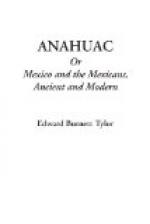For a wonder we have a good road, and this simply because the Real del Monte Company wanted one, and made it for themselves. How unfortunate all Spanish countries are in roads, one of the most important first steps towards civilization! When one has travelled in Old Spain, one can imagine that the colonists did not bring over very enlightened ideas on the subject; and as the Mexicans were not allowed to hold intercourse with any other country, it is easy to explain why Mexico is all but impassable for carriages. But if the money—or half of it—that has been spent in building and endowing churches and convents had been devoted to road-making, this might have been a great and prosperous country.
For some three hours we rode along among porphyritic mountains, getting higher at every turn, and enjoying the clear bright air. Now and then we met or passed a long recua (train) of loaded mules, taking care to keep the safe side of the road till we were rid of them. It is not pleasant to meet a great drove of horned cattle in an Alpine pass, but I really think a recua of loaded mules among the Andes is worse. A knowing old beast goes first, and the rest come tumbling after him anyhow, with their loads often projecting a foot or two on either side, and banging against anybody or anything. Then, wherever the road is particularly narrow, and there is a precipice of two or three hundred feet to fall over, one or two of them will fall down, or get their packs loose, and so block up the road, and there is a general scrimmage of kicking and shoving behind, till the arrieros can get things straight again. At last we reach the top of a ridge, and see the little settlement of Real del Monte below us. It is more like a Cornish mining village than anything else; but of course the engine-houses, chimneys, and mine-sheds, built by Cornishmen in true Cornish fashion, go a long way towards making up the resemblance. The village is built on the awkwardest bit of ground possible, up and down on the side of a steep ravine, one house apparently standing on the roof of another; and it takes half a mile of real hard climbing to get from the bottom of the town to the top.
We put up our horses at a neat little inn kept by an old Englishwoman, and walked or climbed up to the Company’s house. We made several new acquaintances at the Real, though we left within a few hours, intending to see the place thoroughly on our return.
One peculiarity of the Casa Grande—the great house of the Company—was the warlike appearance of everybody in it. The clerks were posting up the ledgers with loaded revolvers on the desk before them; the manager’s room was a small arsenal, and the gentlemen rode out for exercise, morning and evening, armed to the teeth. Not that there is anything to be apprehended from robbers—indeed I should like to see any of the Mexican ladrones interfering with the Cornish miners, who would soon teach them better manners. I am inclined to think there is




